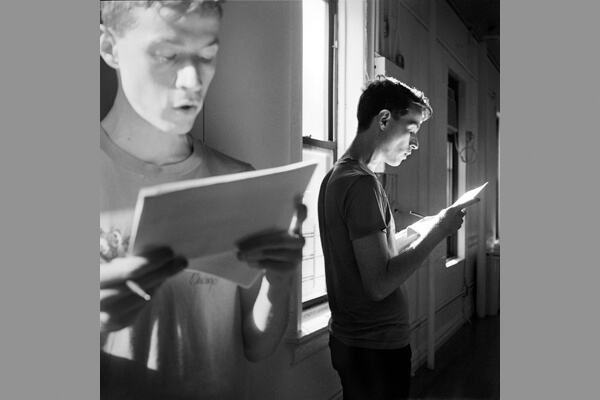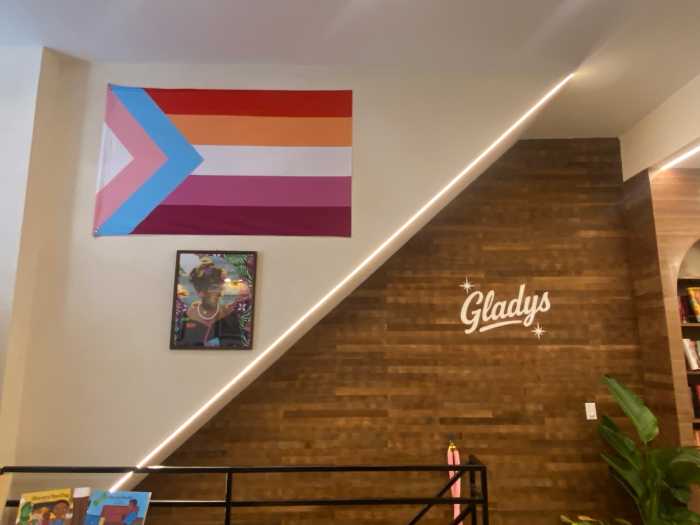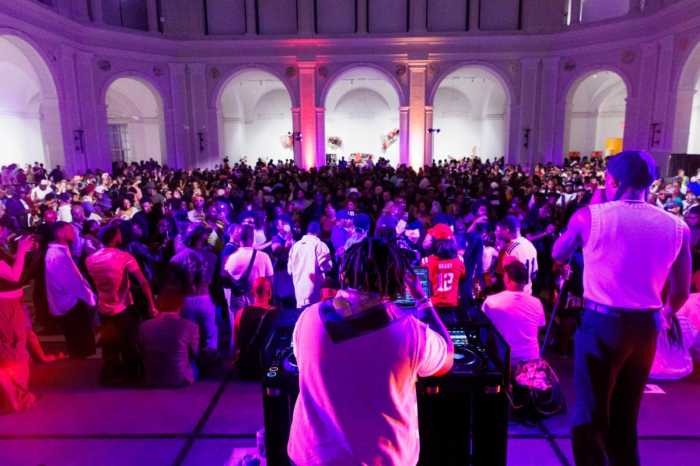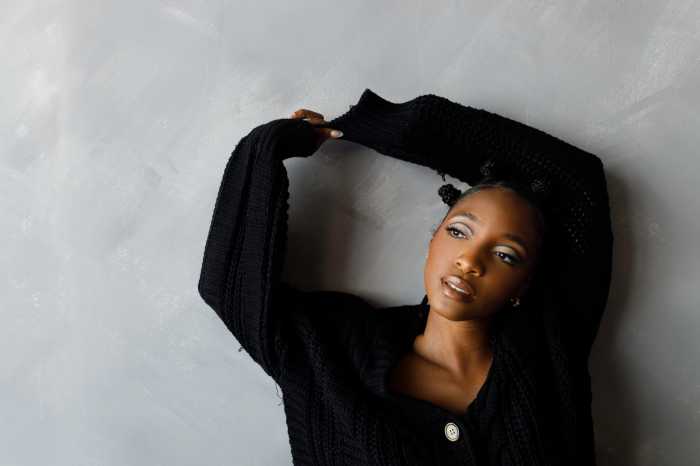Max Steele presents his one-man-show “ENCOURAGER” as part of BAX’s Artists-in-Residence performance series April 26-28. | DANIEL RAMPULLA
BY BRIAN MCCORMICK | Max Steele is a writer, blogger, singer/ songwriter, bandleader, performance artist, ersatz go-go boy, and self-affirmed figure of the New Gay Underground — a kind of folksy new millennium would-be Warhol or Wojnarowicz with strong lesbian influences. The suburban West Coast queer punk escaped to New York via Sarah Lawrence College, and settled into the burgeoning cultural morass of North Brooklyn as 21st century queer aesthetics began to crystallize.
While many artists these days assume alternate identities, and many others act out routines of their daily lives as a performance, Max Steele — his real name — is a curious mash-up of publicized/ privatized identity expressions. His life and art are symbiotic, woven into a purposeful performance, embodying a loose — not wholly calculated — politicization of the personal and, naturally, the inverse thereof.
The performance of self in everyday art #queer
His zine, Scorcher, features sexually explicit autobiographical stories. His blog, This Is Fag City, is a personal diary really, filled with psychological, astrological, and artist-process musings, as well as an encyclopedia of reports from the New York City queer art party scene. Both are written under the name of Billy Cheer — a secular spiritual guru, who will be appearing in April at BAX in a new solo performance by Steele called “ENCOURAGER.” Staged as a “Courage Workshop,” the performance will guide audiences through emotional strategies, drawing from the vernaculars of self-help books, queer and punk subcultures, and radical politics, and working toward personal liberation through self-destruction.
Gay City News interviewed Steele in advance of his performances at BAX.
BRIAN McCORMICK: You have been called a writer, a performer, a go-go boy, and a band. How do you describe yourself?
MAX STEELE: Sometimes I just say I'm an artist to save time, but then people ask me what kind of art I make, so I usually just say writer and performer, but I don't see a tremendous distinction between those two practices. I treat my life as an art project. Everything is up for grabs. It’s a process more than a project, really. I’m trying to figure something out.
BM: You wrote on your blog that you are not thrilled with the idea of playing a character [Billy Cheer] in this show. Can you elaborate on what you mean by this. Isn’t all performance playing a character?
MS: Billy Cheer emerged as a kind of artistic gesture, which grants me some freedom in terms of my imagination and what I feel like I'm allowed to say, but it also sort of undermines other aspects of performing. I write Scorcher as Billy Cheer, too. It's not a tremendously different character than the real me: it's just that Billy is the euphemism for when I'm letting my imagination run wild. I think all performance is mediated, all performance is a character. But by the same token, all art is mediated and any human interaction involves a certain amount of characterization.
BM: Another related notion is that you are an imposter, a fake, uninteresting, derivative, which doesn’t seem to be a deliberate attempt at self-deprecation but almost a motivating factor for your artist identity.
MS: Thank you for getting this! I do feel like a fake, an impostor, a pretender. And I want to embody those ideas, because I think it's a totally 100 percent okay, valid, and beautiful way to live. I'm playing up how shitty and empty inside I am, as a way of demonstrating that that distinction is murky to begin with — how would anyone know? — as well as to call attention to the fact that making such a distinction doesn't actually change anything. I think it's totally okay to be a fake person. Look how much we have in common. If I'm an impostor and you identify with me, does this mean that you might be an impostor too?
BM: What are the forces that feed and drive your imagination? On the topic of derivation, who are you inspired by, who do you borrow from, and what have you stolen from yourself lately?
MS: I feel like the word failure has kind of gotten a bad rap through overuse. The forces that feed my imagination are things like failure, fear, exhaustion, anger, resentment, doubt. These are understood as negative feelings, so we intuitively seek to avoid them. But, of course, they're unavoidable, so I've been working to incorporate them into my art and find a way to feel free and excited and sexy while also feeling like a fuck-up.
I've definitely been cannibalizing myself in making “ENCOURAGER.” I've been revisiting some of the writing I did for Scorcher and other projects over the years, looking for times when I started to hint at the tone I want the new piece to have.
In terms of being derivative, I'm tremendously influenced by Kathy Acker, still. Two books I read in the last year particularly influenced the way I'm looking at making this project: “Inferno” by Eileen Myles and “Zippermouth” by Laurie Weeks. In different ways, I felt like someone opened a trap door in my imagination. I didn't know you could think like that or feel like that — or talk like that, write like that.
BM: You have an affinity for lesbian writers.
MS: A lot of people my age seem to think that the lesbian community evolved apart from the male queer scene. That’s not historically accurate. At the height of the AIDS crisis, it was lesbian sisters taking care of gay brothers. We have a very intertwined history. The idea that gay male culture has evolved distinctly is a fallacy.
BM: Where did you draw your material and inspiration from for “ENCOURAGER,” and what was your process for developing this work? Is this typical for you, or is it unusual to work with an institution like BAX? You recently had a showing for the BAX teens and wrote on your blog about how they seemed to get it — and not question it even as much as you.
MS: The whole “ENCOURAGER” project is uncharted territory for me and could not have happened without the fantastic support of the BAX Artists-in-Residence program. It's very rare for me to work with any kind of support, let alone an institution as smart, savvy, and understanding as BAX. I'm using this new opportunity to make very different work from anything I've attempted before.
The BAX Teen Arts Conference was amazing. I was absolutely mortified to perform for a group of teenagers. I was certain they were either not going to understand the humor or logic of my piece or would just balk at the woo-woo touchy-feely nature of it, and I grossly underestimated the kids. They treated my performance as just someone talking, just saying what was on their mind, which is exactly what I wanted and was afraid to admit I wanted. The kids have feelings. That's what I'm excited to hear about.
BM: Aside from this project at BAX, what have you been on about lately, and what do we have to look forward to beyond April?
MS: In the process of making “ENCOURAGER,” I've written a ton of material and discarded about 70 percent of it. It feels good to be constantly editing and boiling down, but I'm also excited to have reams of pages of performance text. So, likely another, more light-hearted, and narrative show is in the works before too long. I'm also excited to get back to work on my psychedelic porno poetry zine, Scorcher. The next issue, when I get around to it, is going to be called Valedictorian and, I think, will be worth the wait.
BM: Who is your audience?
MS: Yvonne Rainer once said her audience is necessarily really small. That always resonated with me. I like the idea of an audience that knows how to read my work in the way I want it to get read. But now I think that’s not democratic enough for me. I’m interested in having a new experience. What I’m doing is not spectacularly glamorous. You don’t get dazzled. I want people who are willing to do a little bit of work. My dream is always to have cool girls. That would be the ultimate compliment.
MAX STEELE | “ENCOURAGER” | BAX/ Brooklyn Arts Exchange | 421 Fifth Ave. at Eighth St., Park Slope | Apr. 26-27 at 8 p.m.; Apr. 28 at 6 p.m. | $8-15 at bax.org or 718-832-0018

































